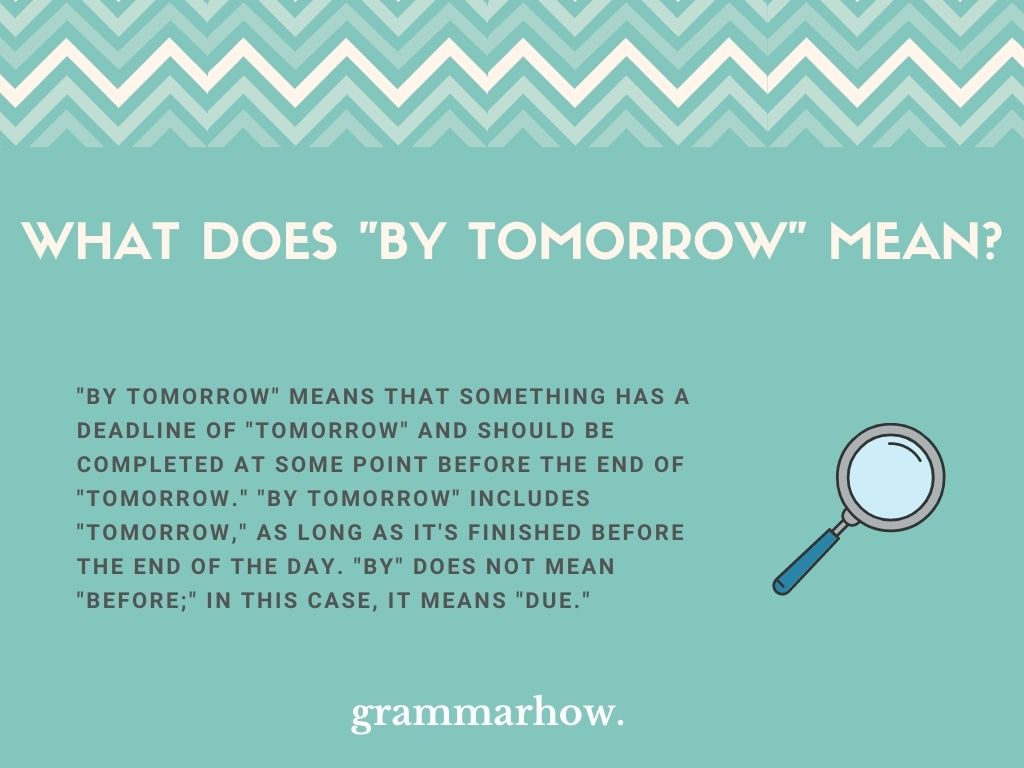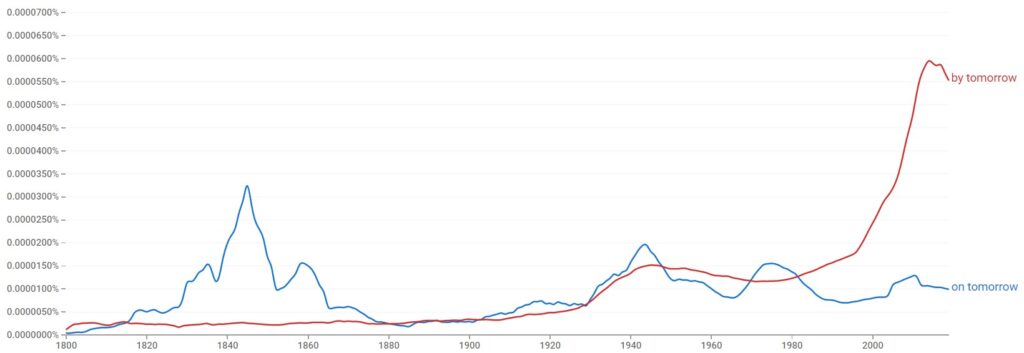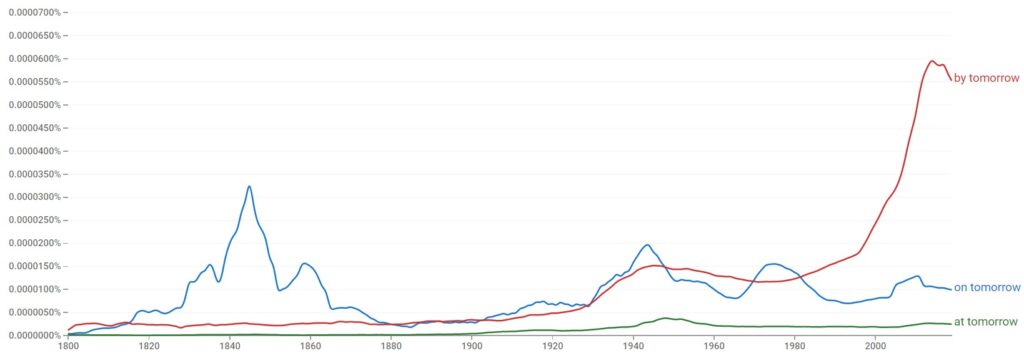The phrase “by tomorrow” is something that we might hear in English, especially when someone is setting a deadline for something. It would help to know what it means and whether it also includes “tomorrow” as part of the deadline or not, so this article will explain it.
What Does “By Tomorrow” Mean?
“By tomorrow” means that something has a deadline of “tomorrow” and should be completed at some point before the end of “tomorrow.” “By tomorrow” includes “tomorrow,” as long as it’s finished before the end of the day. “By” does not mean “before;” in this case, it means “due.”

We use “by tomorrow” to talk about something that is due at a certain time. That time generally happens between today and tomorrow (depending on the urgency of the task).
We can also replace “tomorrow” with any other day, like “by Monday” or “by the weekend.” In all cases, as long as the deadline is met (i.e., it happens no later than the specified day), then the “by” phrase will be correct.
Examples Of How To Use “By Tomorrow” In A Sentence
Let us explain a little more about how it works by including some examples. With the help of these examples, you’ll have a much better time understanding what “by tomorrow” means and how you can use it.
- I want these papers on my desk by tomorrow, or it’ll be the end of your career!
- I need these documents by tomorrow to plan my next move.
- Apparently, my delivery will arrive by tomorrow, but I don’t know whether I can trust the service!
- She wants your answer by tomorrow, which gives you plenty of time to think about it.
- I let him sleep on it and told him I expected his decision by tomorrow.
- By tomorrow, it will be too late for any of us to enjoy our time together because we’ll all be heading home!
- You have to text me the information by tomorrow; otherwise, I don’t know where I’m going.
“By tomorrow” means that something is due tomorrow, and that thing could be delivered at any point in the day. There’s also a chance that we can deliver the thing earlier than “tomorrow”(i.e., “today”).
It’s just a way for somebody to set a deadline for us, and we usually have to follow such a deadline. Typically, we’ll be given a reason alongside the deadline to explain what would happen if we didn’t get our task done on time.
Does “By Tomorrow” And “Today” Mean The Same?
There are a few ways you might use a phrase that sets a deadline. We could say something like:
- I need this by tomorrow.
- I need this today.
Of course, both “by tomorrow” and “today” are ways to set deadlines, but do they mean the same thing?
“By tomorrow” and “today” do not mean the same. “By tomorrow” gives us a chance to hand in the task today or tomorrow, while “today” limits us to only handing in something today; otherwise, we will be past the deadline.
If someone says that something must be handed in “today,” it’s usually an urgent task. Hopefully, there will already have been ample warning for you to make sure you were prepared to hand it in; otherwise, you might not have time to finish the task, depending on how long it takes to finish.
Can “Tomorrow” And “By Tomorrow” Ever Be Used Interchangeably?
We could also use “tomorrow” in place of “today,” but does “tomorrow” mean the same as “by tomorrow?”
“Tomorrow” means that something has to be handed in tomorrow. It means we can’t hand it in today or any day after tomorrow. On the other side, “by tomorrow” means today or tomorrow, depending on the task. Therefore, the phrases are not interchangeable.
“Tomorrow” is closer in meaning to “by tomorrow” than “today” was in the previous section. However, it’s still not exactly correct.
“Tomorrow” is far too specific about when we have to hand something in.
- I need these papers tomorrow. (Deadline is tomorrow, no earlier and no later)
- I need these papers by tomorrow. (Deadline is tomorrow, but earlier is acceptable)
As you can see, “tomorrow” is more specific, while “by tomorrow” allows for much more leniency in the delivery.
What Is The Difference Between “By Tomorrow” And “On Tomorrow”?
The preposition “by” is a great way to show when something needs to be delivered. Of course, that doesn’t stop some people from wanting to try other prepositions, and that’s where we come across phrases like “on tomorrow.”
You should use “by tomorrow” when setting someone a deadline that ends at the end of the day tomorrow. “On tomorrow” is not a correct phrase on its own, and we typically use it with “tomorrow” in the possessive form (i.e., “on tomorrow’s program”).
“On” is not the right preposition to use with “tomorrow.” There is no reason to specify that we’re “on” a day like “tomorrow” because it doesn’t add anything extra to the meaning.
You’ll only see it when “tomorrow” is in the possessive form, as follows:
- On tomorrow’s show, you’ll find out what happened.
- On tomorrow’s showings, you’ll see a movie you’ve wanted to see forever.
We might also ask what’s on TV tomorrow. As you can tell, the theme for using “on tomorrow” mostly works for television rather than any other context:
- What’s on tomorrow?
According to Google Ngram Viewer, “by tomorrow” is vastly more popular than “on tomorrow.” This shows that “by tomorrow” is the only correct choice when setting a deadline, while “on tomorrow” only applies when you’re talking about a program or something on television.

Is It Ever Correct To Use “At Tomorrow”?
We can also try and look into another preposition before “tomorrow,” which is “at.” Unlike “on tomorrow,” there are no valid situations where “at tomorrow” makes sense, unless you’re speaking in colloquial cases.
It is never correct to use “at tomorrow” in formal writing. There are very few cases informally where you might use it (i.e., “where are you at tomorrow?”).
According to Google Ngram Viewer, “at tomorrow” is the least popular preposition of the three, and for a good reason. It’s not commonly used except in rare informal cases, so you won’t see it work well compared with “by tomorrow” or even “on tomorrow.

What Is The Difference Between “By Tomorrow” And “Until Tomorrow?
One other preposition we want to go through is “until,” which is possible to use with the word “tomorrow.” It will help you to understand how it works.
“By tomorrow” sets a deadline for something for the end of the day tomorrow. “Until tomorrow” is what we say when we’re expecting to do something or see someone again tomorrow, and we’re waiting for that point in time to occur.
“Until tomorrow” doesn’t have the same meaning as “by tomorrow,” and we’ll use it in different ways. Here are the most common ways to see it written:
- Until tomorrow, I guess this is goodbye! See you again soon!
- I will have to wait for this until tomorrow, which is really annoying.
- Until tomorrow comes, there isn’t much more we can do about this.
- Till tomorrow arrives, we’re just going to have to sit and watch the paint dry.
- He won’t be here till tomorrow, but you can make yourself at home while we wait.
“Until” and “till” are synonymous, which means we can use either variation in sentences. Typically, “till” is slightly less formal, so it works better in spoken English than anything else.
Is It “By Tomorrow Noon” Or “By Noon Tomorrow”?
What happens if we want to specify the time “tomorrow” that the deadline is set? We might include words like “noon” or “night,” but we need to make sure we’re getting the structure correct before writing it.
“By noon tomorrow” is correct when you want to set a deadline for midday tomorrow. We place the time of day before the day itself to show when something has to happen, and it’s rare that the other way around is seen.
To prove this, take a look at Google Ngram Viewer. Here, we can see that “by noon tomorrow” is the preferred option, and there’s quite a large difference in usage between the two phrases.

While “by tomorrow noon” does occasionally get used, it is not correct grammatically. We have to place the time before the day when we’re speaking in this way, so make sure you say “noon tomorrow.”
What Does “Delivery By Tomorrow” Mean?
“Delivery by tomorrow” means that your delivery will arrive today or tomorrow.
If you’ve sent for a delivery or ordered something online, you’re often given a deadline of when that will arrive. That deadline will usually say “by” and then give you a date or specific day of the week.
In these cases, you can expect your delivery to arrive at some point within the next few days, and it won’t arrive any later than “tomorrow” in the case of “by tomorrow.”
- You will receive your delivery by tomorrow.
- Your delivery will arrive by Monday.
You might also like: Due On, Due By, Or Due For? Difference Explained (+18 Examples)

Martin holds a Master’s degree in Finance and International Business. He has six years of experience in professional communication with clients, executives, and colleagues. Furthermore, he has teaching experience from Aarhus University. Martin has been featured as an expert in communication and teaching on Forbes and Shopify. Read more about Martin here.
